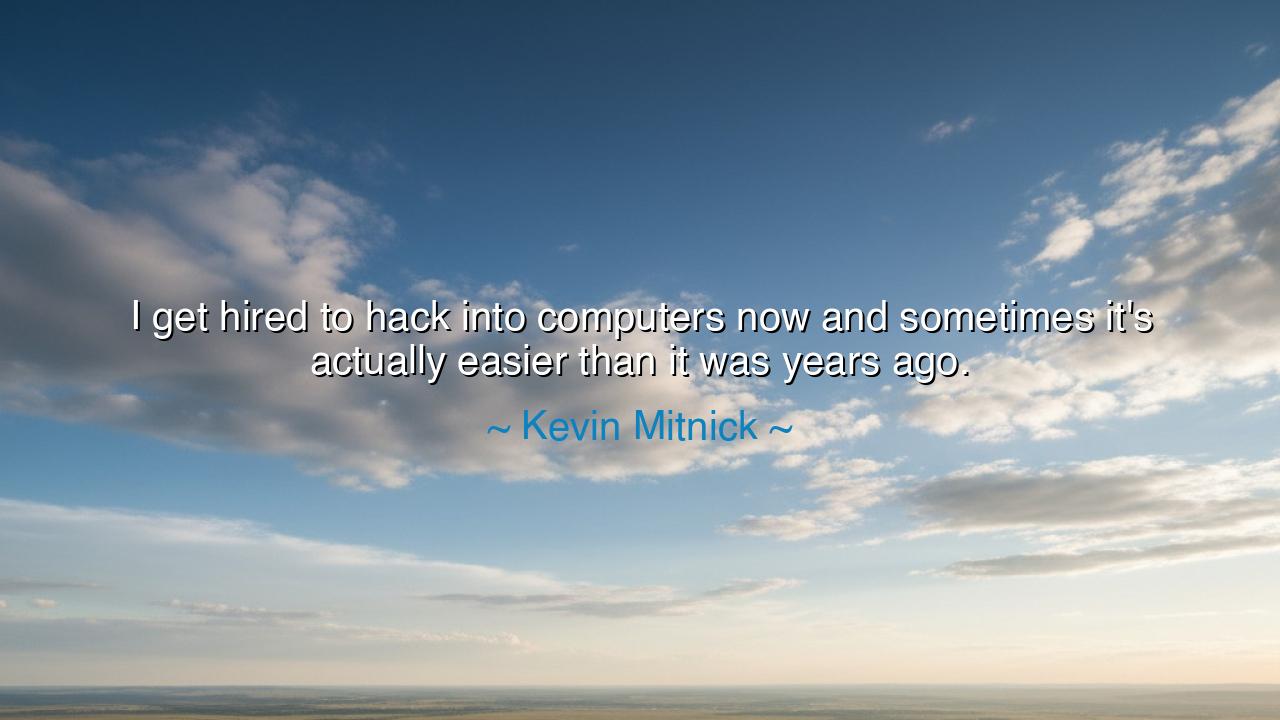
I get hired to hack into computers now and sometimes it's
I get hired to hack into computers now and sometimes it's actually easier than it was years ago.






In the age when the heavens were still mysterious and men sought to understand the forces that governed their world, there was a quiet but powerful truth: knowledge is both a gift and a burden. For as knowledge grows, so too does the ability to wield it, and with it, the temptation to stray into darker paths. "I get hired to hack into computers now and sometimes it's actually easier than it was years ago," said Kevin Mitnick, a man whose name became synonymous with the ancient art of hacking. His words, though simple, reveal a profound shift in the landscape of technology, a transformation that echoes through the halls of history like the rise of an empire or the fall of a civilization. For in his statement lies a warning—a recognition that as our tools become more sophisticated, so too does the ease with which they can be misused.
Let us consider, for a moment, the nature of hacking. In the most ancient of times, men sought power through brute force: armies fought with weapons, kings ruled with fear, and secrets were guarded with walls and fortresses. But as the world evolved, so too did the methods by which power was exerted. The art of hacking, in many ways, is the modern-day equivalent of those ancient thieves who sought to break into the citadels of kings, but instead of physical walls, they infiltrate the digital ones. And just as the gatekeepers of old were unaware of the ways in which their walls could be breached, so too are modern systems often unaware of the vulnerabilities in their digital architecture. Mitnick's words reflect this shift: technology, once a fortress, has become a house of cards—fragile, interconnected, and vulnerable.
In the time of Julius Caesar, when a message was sent across the empire, it was often sealed and guarded by men who swore oaths to protect it. The art of espionage, the gathering of secret knowledge, was a matter of life and death. It was a dangerous game, played by those with the courage to navigate the shadows. But today, knowledge flows not through whispered words and letters sealed with wax, but through invisible currents of ones and zeros. The hacker, like the ancient spy, operates in the shadows, but their tools are more potent than any dagger or sword. And yet, just as the fall of Rome was not caused by a single enemy but by a thousand small vulnerabilities, so too has the age of hacking revealed that even the most secure systems can be compromised with relative ease.
Mitnick's statement about the increasing ease of hacking is not merely a reflection on the changing tools and techniques; it is a lamentation of a deeper truth. The very nature of our technological society has made us all vulnerable. Just as ancient cities grew too large, too complacent in their power, so too have we become overly reliant on systems that we do not fully understand. In the past, the dangers came from the visible enemy—those who sought to break into our gates. But today, the dangers are more subtle, often hidden beneath layers of encryption and complex firewalls. The hacker, once seen as a rogue or outlaw, is now an almost necessary force, hired to uncover the cracks in our digital fortresses, to reveal the vulnerabilities we would rather ignore.
To understand this in context, consider the fall of Constantinople in 1453, when the once-impregnable city fell to the Ottoman Empire. For centuries, its walls had withstood countless sieges. But when the Ottomans finally breached the city, it was not through sheer force of arms alone. The fall came through the discovery of weaknesses—hidden vulnerabilities in the city's defenses, once thought unassailable. Just as the digital world is built upon systems of interconnection and complexity, so too was Constantinople built upon layers of fortifications that seemed invincible. And yet, with the right knowledge, the unthinkable became possible.
And so, the lesson that Mitnick's words impart to us is both cautionary and empowering. In this age, as we build our fortresses—be they physical, digital, or mental—we must understand that they are never truly invulnerable. The knowledge of how to breach them is ever-growing, ever-changing, and ever more accessible. The real challenge is not in creating walls, but in creating resilience—the ability to adapt, to learn, and to recognize that vulnerability is not something to fear, but something to acknowledge and address. Just as warriors of old would train for battle, we must now train in the arts of cybersecurity, vigilance, and wisdom. We must be ever aware that the battle is not just against the forces outside, but against the complacency that allows us to believe our systems are impervious.
So, let us take Mitnick's words to heart. In this world of increasing connectivity and complexity, we must remain ever vigilant, for knowledge alone is not enough—it must be accompanied by wisdom, foresight, and responsibility. Just as ancient sages warned against the dangers of unchecked power, so too must we understand that technology, in its brilliance, also carries the potential for great harm. Let us not build our castles upon sand, but upon the rock of understanding, preparedness, and constant learning. For in the world of the hacker, where systems are always evolving, the true strength lies not in building unbreakable walls, but in knowing how to defend against the inevitable breach.






AAdministratorAdministrator
Welcome, honored guests. Please leave a comment, we will respond soon